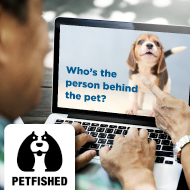
Public urged to look for signs of disreputable sellers
The UK government has launched a new campaign which aims to educate the public on the illegal pet trade, and help them to spot ‘red flags’ when buying a new pet.
The ‘petfished’ campaign – a play on the social media term ‘catfishing’ – hopes to disrupt the high demand for puppies and kittens and encourages potential buyers to learn about the tactics used by pet sellers to trick buyers into believing the animals are healthy and well looked-after.
It complements the forthcoming ban on commercial third-party sales of puppies and kittens in England – known as Lucy’s Law – which comes into effect on 6 April 2020.
The ‘petfished’ website provides a wealth of information for potential buyers, including a checklist for buying a cat or dog, links to breeder schemes, contact information for reporting deceitful breeders and adverts, and advice for those looking to adopt.
UK chief veterinary officer, Christine Middlemiss said: “Vets see the tragic effects of ‘Petfishing’ first-hand but so too do the public who may be put through the pain and cost of looking after, and even losing, a sick puppy or kitten due to the conditions it was bred in.
“It’s vital that prospective pet owners take responsibility for where they get their pets from and avoid puppy-farms and unscrupulous dealers. The campaign launched today sets out the simple steps that can be taken by the public to spot the warning signs and ensure their puppy or kitten is given the best start in life.”
Animal welfare minister Lord Goldsmith added: “The animals reared on puppy farms are often in awful conditions which can lead to chronic health problems, behavioural issues, and, in the most tragic cases, death. This simply has to stop and the public can do its bit to help.
“We urge anyone thinking about getting a pet to do the right thing. Do thorough research and ensure you go to a reputable breeder in the UK – don’t get ‘Petfished’.”
Defra has released a short film alongside the campaign, with interviews and real-life stories, which asks ‘Do you know who’s the person behind the pet?’



 The RCVS has announced a new version of its 1CPD mobile app, with enhanced features for veterinary surgeons and veterinary nurses to record their continuing professional development.
The RCVS has announced a new version of its 1CPD mobile app, with enhanced features for veterinary surgeons and veterinary nurses to record their continuing professional development.